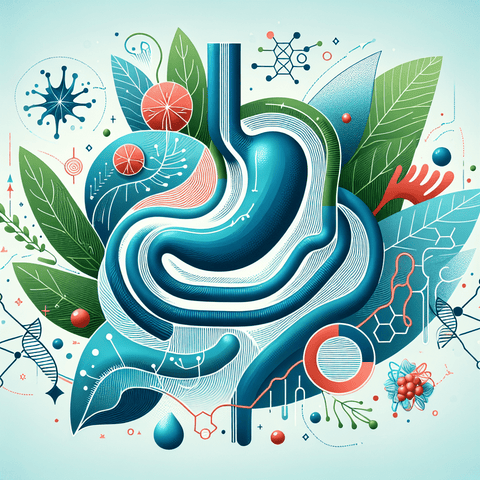Introduction
Vitamin B12, also known as cobalamin, is a water-soluble essential nutrient that plays a crucial role in numerous physiological processes. It is indispensable for nerve function, red blood cell formation, DNA synthesis, and energy metabolism. Despite its importance, many individuals around the world suffer from B12 deficiency or suboptimal absorption, leading to a host of health issues such as fatigue, neurological problems, and impaired immune function. The key to harnessing the full health benefits of vitamin B12 lies not just in consuming enough of it, but also in ensuring optimal absorption. In this comprehensive guide, we will explore the science behind B12 absorption, factors influencing its bioavailability, and practical strategies to maximize its benefits for your body. Whether you are considering supplementation or looking to improve your diet, understanding how B12 is absorbed can empower you to make informed choices and unlock its full potential in promoting overall wellness.
Understanding B12 Absorption in Nutritional Supplements
Vitamin B12 is a complex nutrient with a unique absorption process that involves multiple steps within the gastrointestinal (GI) tract. Its journey begins with ingestion, where B12 enters the stomach bound to proteins in food or as part of supplement formulations. In the stomach, gastric acid and enzymes such as pepsin release B12 from dietary proteins, making it available for binding to intrinsic factor (IF), a glycoprotein secreted by parietal cells in the stomach lining. Once free, B12 binds to intrinsic factor to form a complex that resists digestion and is critical for subsequent absorption in the small intestine.
The primary site of B12 absorption is the ileum, the final segment of the small intestine. Here, specialized receptors recognize the B12-intrinsic factor complex, facilitating uptake into the enterocytes—cells lining the intestinal wall. Inside these cells, B12 is released and binds to transcobalamin II, a carrier protein responsible for transporting B12 through the bloodstream to tissues for utilization. This process is tightly regulated and can be influenced by various factors, including age, gut health, and medication use.
When it comes to supplementing B12, the form and route of administration significantly impact absorption. Oral tablets and capsules rely on the efficiency of the GI tract to process and absorb B12, which can be compromised in individuals with gastric insufficiencies or absorption issues. Sublingual B12 supplements, placed under the tongue, are designed to bypass some digestive steps, allowing for direct absorption through mucous membranes. Injectable B12, administered via intramuscular injections, sidesteps the digestive system altogether and delivers B12 directly into the bloodstream, proving especially effective for those with severe deficiencies or absorption impairments. Other forms like sublingual liquids and patches offer alternative delivery methods, each with their own absorption efficiencies. Understanding these differences is vital for selecting the most suitable supplement strategy for optimal B12 uptake.
Unlocking the Potential: Vitamin B12 Bioavailability and Its Impact on Efficacy
Bioavailability refers to the proportion of a nutrient that is absorbed and reaches systemic circulation in an active form. For B12, bioavailability varies depending on the chemical form, the supplement matrix, and individual factors such as gut health. The efficacy of B12 supplementation hinges on its ability to be absorbed efficiently and utilized effectively by the body.
Various chemical forms of B12 are available, each with different bioavailability profiles. The most common are cyanocobalamin, methylcobalamin, hydroxocobalamin, and adenosylcobalamin. Cyanocobalamin is widely used due to its stability and cost-effectiveness, but it requires conversion in the body to active forms. Methylcobalamin and adenosylcobalamin are natural coenzymes found in tissues, offering potentially higher immediate bioavailability. Hydroxocobalamin, often used in injections, has a longer half-life and can be converted into active forms within the body.
Manufacturing processes, such as stabilization techniques and delivery system design, influence the bioavailability of B12 supplements. For example, liposomal formulations and sublingual preparations are crafted to enhance absorption by protecting B12 from degradation and facilitating mucous membrane uptake. When choosing a supplement, opting for high-bioavailability products—such as methylcobalamin or those with enhanced delivery systems—can ensure that more B12 reaches your tissues, amplifying its health benefits.
To maximize efficacy, consumers should consider products that specify bioavailability data or utilize advanced delivery methods. Consulting with healthcare professionals can help identify the most effective form and dosage tailored to individual needs. For instance, individuals with absorption issues may benefit from injections or high-bioavailability sublingual products, which bypass compromised gastrointestinal pathways.
In summary, understanding the bioavailability of B12 supplements is essential for optimizing absorption and effectiveness. Selecting high-quality, bioavailable formulations ensures that your body can utilize B12 fully, supporting energy production, neurological health, and immune function.
Vitamin B12 Deficiency Prevention: Ensuring Adequate Intake and Absorption
B12 deficiency can develop insidiously due to inadequate intake, impaired absorption, or increased bodily requirements. Recognizing the signs and symptoms of deficiency is essential for early intervention. Common indicators include persistent fatigue, weakness, pale or jaundiced skin, neurological symptoms such as tingling and numbness, memory lapses, and mood changes. Since B12 deficiency can cause irreversible neurological damage if left untreated, proactive measures are critical.
Certain populations are at higher risk of deficiency. Vegetarians and vegans often have lower dietary B12 intake because plant-based foods contain negligible amounts of the vitamin. Older adults are susceptible due to naturally declining stomach acid production, which impairs B12 release from food. Individuals with gastrointestinal disorders like Crohn's disease, celiac disease, or pernicious anemia have compromised absorption capacities. Long-term medication use, such as proton pump inhibitors or metformin, can also interfere with B12 uptake by altering stomach acidity and intestinal function.
Inadequate intake is a common contributor to deficiency, especially among plant-based diets lacking fortified foods or supplements. Ensuring sufficient B12 intake through diet, fortified foods, or supplements is essential. Fortified plant-based foods and nutritional Yeasts are practical dietary sources for vegans and vegetarians. However, given absorption challenges, many at-risk groups benefit from direct supplementation via high-bioavailability preparations.
Effective strategies to prevent deficiency include routine B12 monitoring for high-risk populations and using supplements when dietary intake falls short. Combining dietary sources with supplements helps maintain optimal B12 levels. Regular blood tests can identify early deficiency markers such as elevated methylmalonic acid or homocysteine levels, guiding timely intervention. In addition to supplementation, addressing factors affecting absorption—like gut health—is vital for long-term B12 status.
Overall, preventive measures involve awareness of risk factors, dietary planning, and appropriate supplementation. Healthcare consultations are recommended for tailored plans, especially for those with known health conditions or age-related absorption decline. By proactively managing B12 intake and absorption, you can sustain vital physiological functions and prevent deficiency-related complications.
Methylcobalamin Absorption: The Best Form for Optimal B12 Utilization
Methylcobalamin, a natural coenzyme form of B12, has garnered increasing attention for its superior absorption and utilization properties. Unlike cyanocobalamin, which requires conversion into active forms within the body, methylcobalamin is directly bioavailable, facilitating immediate incorporation into metabolic processes. This direct active form naturally occurs in the human body, mainly in brain tissue and nerve cells, underscoring its significance in neurological health.
One of the key advantages of methylcobalamin is its stability. It resists degradation in storage and within the body, maintaining its efficacy during supplementation. Scientific studies suggest that methylcobalamin is more efficiently absorbed in the digestive tract, especially beneficial for individuals with absorption challenges or neurological conditions. Its ability to cross the blood-brain barrier and accumulate in neural tissue makes it particularly effective in supporting nerve regeneration, cognitive function, and energy production.
Research indicates that methylcobalamin enhances nerve repair and reduces neurological symptoms better than other forms. For example, in cases of peripheral neuropathy or neurological degeneration, methylcobalamin has shown promising results in clinical trials, promoting nerve fiber regeneration and reducing nerve pain. Furthermore, methylcobalamin’s role in methylation processes affects DNA synthesis, amino acid metabolism, and detoxification pathways, emphasizing its comprehensive benefits.
When selecting methylcobalamin supplements, look for products that specify high purity and stability. Choosing sublingual or injectable forms can optimize absorption further. Retailers like Topvitamine offer methylcobalamin-based supplements tailored for neurological and energy support, providing a reliable source for effective B12 intake.
In addition to its absorption efficiency, methylcobalamin’s ability to support neurological health and energy metabolism makes it an excellent choice for individuals seeking optimal B12 utilization. Incorporating methylcobalamin into your supplement regimen, especially if you have absorption difficulties or neurological concerns, can significantly enhance your overall health and vitality.
B12 Supplementation Tips: Maximizing Absorption and Effectiveness
When it comes to B12 supplementation, dosage, timing, and combination with other nutrients significantly influence absorption and overall effectiveness. The appropriate dosage varies based on age, health condition, and specific needs. For example, adults typically require 2.4 micrograms daily, but higher doses (e.g., 500 mcg to 1000 mcg) are often recommended for deficiency correction, as excess B12 is water-soluble and generally excreted harmlessly.
For optimal absorption, consider taking B12 supplements on an empty stomach or at least 30 minutes before meals, as food intake can interfere with absorption. However, some individuals find better absorption when taking B12 with meals—especially if formulated for sublingual or fast-release tablets. Timing your B12 intake in conjunction with other nutrients like folate and iron can promote synergistic effects, supporting blood health and energy production. For instance, combining B12 with folate (available in [vitamin B complex](https://www.topvitamine.com/collections/vitamin-c-benefits-immunity-antioxidant-energy)) enhances methylation processes crucial for cellular function.
Certain medications, such as proton pump inhibitors and metformin, impair stomach acid production or interfere with B12 absorption, necessitating higher doses or alternative administration routes. Awareness of these factors can help tailor supplementation strategies. Engaging healthcare professionals for personalized plans ensures safety and maximizes benefits.
Finally, selecting high-quality supplements from reputable sources, such as methylcobalamin or sublingual B12 formulations, guarantees bioavailability. Regular monitoring of B12 status through blood tests can confirm the effectiveness of your regimen and guide adjustments accordingly. By implementing these practical tips, you can enhance B12 absorption, ensuring you receive the full spectrum of health benefits from your supplementation efforts.
Nutrient Absorption Enhancement: Strategies to Boost B12 Uptake by Your Body
Optimizing nutrient absorption extends beyond B12 alone and involves enhancing overall gut health and digestive efficiency. The gastrointestinal microbiome plays a vital role in nutrient synthesis and absorption, including B12. A healthy balance of gut bacteria ensures optimal enzyme function and inflammatory balance, facilitating efficient digestion and nutrient uptake.
Probiotics, prebiotics, and dietary fiber support a thriving microbiome, indirectly promoting B12 absorption. Consuming fermented foods like yogurt, kefir, sauerkraut, or taking probiotic supplements can cultivate beneficial bacteria that produce and assist in nutrient processing. Additionally, maintaining a balanced diet rich in micronutrients and antioxidants helps create an environment conducive to optimal absorption.
Gut enzymes such as pepsin and pancreatic lipases are essential for breaking down food matrices, releasing nutrients for absorption. Ensuring adequate enzyme production through dietary sources—like pineapple, papaya, and digestive enzyme supplements—can facilitate the release of B12 from food proteins, improving bioavailability.
Addressing gut inflammation, infections, or conditions like atrophic gastritis is crucial for those experiencing malabsorption. Medical interventions, such as treating infections or managing autoimmune conditions, can restore gut integrity. Furthermore, lifestyle factors like stress management, reducing alcohol intake, and avoiding unnecessary medications can help preserve gut health, thereby supporting nutrient absorption.
Emerging strategies include using absorption enhancers and adjuvants. For example, certain amino acids or plant extracts may improve mucosal permeability or stimulate digestive secretions. Holistic approaches that integrate diet, lifestyle, and targeted supplementation create a synergistic effect, maximizing B12 utilization and promoting overall health.
By nurturing your gut health and employing these strategies, you can significantly enhance B12 uptake, ensuring your body benefits fully from this vital nutrient. Sustainable health depends on optimizing not only intake but also effective absorption and utilization.
Conclusion: Unlock Your Body’s Potential by Optimizing B12 Absorption
Optimizing vitamin B12 absorption is a multifaceted process that involves understanding the science behind its uptake, choosing high-bioavailability supplements, addressing personal health factors, and supporting gut health. By being proactive about your B12 intake and absorption strategies, you can ensure sustained energy, neurological health, and immune support—all crucial for overall wellness.
Regularly monitoring your B12 levels, consulting healthcare professionals, and adopting lifestyle habits that promote gastrointestinal health can help you maximize the benefits of this essential vitamin. Incorporating methylcobalamin supplements or advanced delivery forms may offer superior absorption, especially for those with known absorption challenges.
Remember, each individual’s needs are unique. Tailoring your supplement regimen with expert guidance, combined with a nutrient-rich diet and lifestyle modifications, positions you to unlock your body's full potential. Don’t wait until deficiency manifests—take control now for improved vitality, mental clarity, and overall health.
Q&A Section
Q1: What is the most effective form of B12 for absorption?
Methylcobalamin is widely regarded as the most effective form for absorption due to its natural, bioavailable state. It does not require conversion within the body and can cross the blood-brain barrier more readily, making it especially beneficial for neurological health and energy support.
Q2: How can I improve B12 absorption if I have gut issues?
If you have gut-related absorption issues, consider options like B12 injections, sublingual supplements, or transdermal patches, which bypass some digestive processes. Supporting gut health with probiotics, a nutrient-dense diet, and addressing underlying conditions also helps restore absorption capacity.
Q3: Are there any foods that naturally enhance B12 absorption?
While dietary sources of B12 include animal products and fortified foods, certain foods like fermented vegetables and fermented dairy support gut health and microbiome diversity, indirectly promoting better absorption. Maintaining a healthy digestive environment is key to absorbing B12 effectively.
Q4: Can lifestyle changes support B12 absorption?
Yes. Stress reduction, avoiding excessive alcohol, managing medications, and maintaining overall gut health through diet and supplements can significantly improve B12 absorption and utilization.
Q5: How do I know if I need B12 supplements?
Signs like fatigue, neurological symptoms, and memory issues may indicate deficiency. Blood tests, including methylmalonic acid and homocysteine levels, provide definitive information. Consulting your healthcare provider for personalized assessment is advisable.
Important Keywords
- Vitamin B12 absorption
- B12 deficiency
- Methylcobalamin
- B12 supplements
- Bioavailability of B12
- Gut health and B12
- B12 supplementation tips
- B12 and neurological health
- High-bioavailability B12 products
- B12 injection vs oral forms



